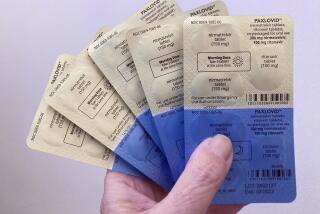Healthcare too costly? Don’t fear telling your doctor
Despite high medical costs topping Americans’ list of financial concerns, many of us have a hard time telling our doctors that the care they’re prescribing may break the bank.
As part of a recent awareness campaign called “I Wish My Doctor Knew,” the online health social network Inspire asked patients and caregivers what medical concerns they wish doctors better understood.
In more than 700 responses, about 20% dealt with insurance coverage, disability insurance coverage paperwork, and out-of-pocket medical costs.
“What we see every day in our online community, and through this campaign, is that patients don’t discuss fully with their doctors the financial toll of [their] disease,” said John Novack, Inspire’s communications director. “Many patients seem reluctant to bring it up at all … yet it’s a very real hardship and it certainly affects their quality of life.”
Ellen Robin of Oceanside, Calif., can relate. The 59-year-old healthcare contract manager has a chronic condition that led to a heart attack six years ago.
Since then, she says, she has collected a cabinet full of prescription drugs worth thousands of dollars. She abandoned most after her doctor told her to stop them — either because they didn’t work or caused unbearable side effects.
“Every time I get a prescription, I pay my co-pay of $30 or more,” she says. After a week or two, many times she’d have a bad reaction and her doctor would advise her to just stop taking it. “It’s a waste.”
Still, letting her doctor know didn’t come easy. “I do have anxiety about talking money with him,” Robin says.
She’s not alone. The financial strain of medical expenses is a tough conversation for many patients to initiate — despite the fact that high costs prevent millions of people from getting needed care.
A report by Families USA, a Washington healthcare advocacy organization, found that just over 1 in 4 adults with private insurance policies last year went without needed medical care because they could not afford tests, treatments, follow-up care and drugs.
One of the biggest causes of “not taking the medicines their doctor prescribed — or getting the tests their doctor ordered — is that patients can’t afford it,” says Duke University professor Dr. Peter Ubel.
“This deserves priority in the doctor-patient encounter,” Ubel says.
Experts offer a few recommendations for broaching the subject of money with your doctors.
Tell it like it is. Doctors are so short on time that it’s easy to feel intimidated about questioning their recommendations, including how much treatments will cost.
“We’ve created this ridiculous power structure, this hierarchical structure that places the physician at the top of that food chain and patients at the bottom. So it’s a very subservient relationship that a lot of patients feel when they go in to talk to their doctor,” says Benjamin F. Miller, professor at the University of Colorado School of Medicine.
Fortunately, that’s starting to change, Miller says. Increasingly, doctors are sensitive to the issue of price. They also recognize the effect that finances can have on a patient’s health.
“If the patient doesn’t say anything, we just don’t know that they didn’t get their prescription refilled because they couldn’t afford it, or … that they’re trying to take on a second job so they can pay for their surgery,” says Dr. Deanna Attai, assistant clinical professor of surgery at UCLA. “I can prescribe whatever treatment I want,” the doctor said, “but it doesn’t do any good if I can’t figure out a way for the patient to pay for it.”
Don’t let lack of price information stop you. It’s tough to talk money when most physicians and patients still have no easy way to determine the price of care.
“Doctors and patients will both say, ‘What’s the point in talking about costs when you can’t figure them out?’” Ubel says. “It’s tricky,” he admits, but that shouldn’t stop you from bringing up the subject.
Even without exact cost information, Ubel says, your doctor often knows which treatments are likely to be more expensive, regardless of your insurance coverage.
For example, generic drugs are cheaper than brands; PET scans are typically pricier than CT (or CAT) scans. A prescription for a 90-day rather than 30-day supply can dramatically lower costs. And it may be that an expensive test done in December will cost less than waiting until January — because you’ve already met your plan’s deductible for the year.
“There’s lot of different things you can do to lower your out-of-pocket costs, but you can’t do many of them if you don’t talk about it,” Ubel says.
Seek financial help. Your doctor’s office may be able to connect you with financial help through co-pay assistance and other programs available to people struggling to afford medicine.
Also, Attai of UCLA suggests patients ask their doctors about clinical research trials.
“If available, we try to steer patients towards clinical trials,” she says, citing that a very small percentage of eligible patients nationwide actually enroll in these studies. “But for some of these newer treatments, patients can potentially get study drugs without having to pay for it,” she says.
Robin in San Diego finally asked her doctor for samples to see whether a new medication worked — before she paid for a whole prescription, and he agreed. But there are other treatments and costs she hasn’t yet found the courage to talk to him about.
“I’m afraid to tell him,” she said, “because he’s the doctor.”
Twitter: @lisazamosky
Zamosky is the author of “Healthcare, Insurance, and You: The Savvy Consumer’s Guide.”






